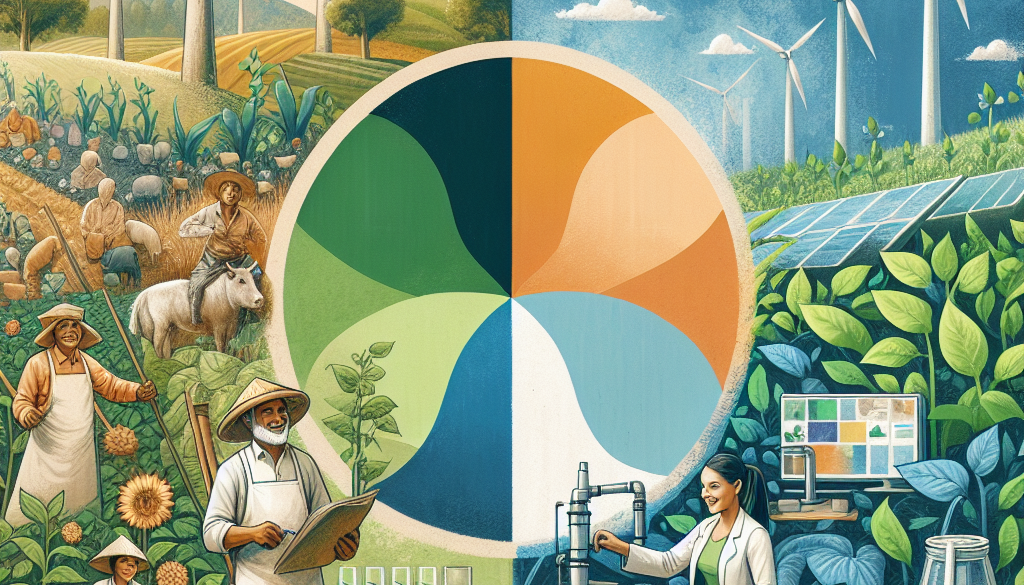Transforming The Food Industry Through A Sustainable Approach
-
Table of Contents
- Transforming the Food Industry with Sustainable Practices
- The Urgency for Sustainable Transformation
- Key Strategies for Sustainable Food Systems
- Case Studies of Sustainable Success
- Challenges and Opportunities
- Policy and Consumer Influence
- Conclusion: The Path Forward
- ETprotein: Leading the Way in Sustainable Protein Solutions
Transforming the Food Industry with Sustainable Practices
The food industry is at a crossroads. With the global population projected to reach 9.7 billion by 2050, the demand for food is expected to increase significantly. However, the current practices of the food industry are often unsustainable, leading to environmental degradation, resource depletion, and social inequities. Transforming the food industry through a sustainable approach is not just a noble goal; it’s a necessity for the survival of our planet and future generations.
The Urgency for Sustainable Transformation
The statistics are alarming: agriculture is responsible for 24% of global greenhouse gas emissions, uses 70% of freshwater resources, and is a leading cause of deforestation. Moreover, food waste contributes to 8% of global emissions. The need for a sustainable transformation in the food industry is clear, and it requires a multifaceted approach that encompasses the entire supply chain.
Key Strategies for Sustainable Food Systems
- Regenerative Agriculture: This approach goes beyond sustainable farming by actively improving the ecosystem. Practices include crop rotation, agroforestry, and the use of natural fertilizers, which enhance biodiversity, enrich soils, and sequester carbon.
- Reducing Food Waste: From farm to fork, reducing food waste can significantly lower greenhouse gas emissions. Innovations in packaging, improved supply chain logistics, and consumer education are crucial.
- Plant-Based Diets: Shifting towards more plant-based diets can reduce the environmental footprint of food production. Livestock farming is one of the most resource-intensive and polluting aspects of agriculture.
- Local and Seasonal Foods: Supporting local food systems reduces transportation emissions and promotes seasonal eating, which is more harmonious with natural ecological cycles.
- Technological Innovations: Advances in technology, such as precision agriculture, can optimize resource use and reduce waste. Additionally, alternative protein sources, like lab-grown meat or plant-based proteins, offer sustainable options.
Case Studies of Sustainable Success
Several companies and organizations have already begun to pave the way for a more sustainable food industry. For instance, Patagonia Provisions, a branch of the outdoor clothing giant, focuses on regenerative organic agriculture to produce its food products. Similarly, Too Good To Go is an app that connects consumers with restaurants and stores to purchase surplus food at a discount, combating food waste.
Challenges and Opportunities
Despite the clear benefits, the transition to sustainable practices faces challenges. These include economic barriers, resistance to change within the industry, and the need for consumer education. However, these challenges also present opportunities for innovation, market differentiation, and the development of new business models.
Policy and Consumer Influence
Policy plays a critical role in shaping the food industry. Subsidies for sustainable farming practices, regulations to reduce food waste, and support for research and development can drive change. Consumers also wield power through their purchasing choices, which can influence industry practices and encourage sustainability.
Conclusion: The Path Forward
The transformation of the food industry through a sustainable approach is an imperative journey that requires the collective effort of producers, consumers, policymakers, and innovators. By adopting regenerative practices, reducing waste, embracing plant-based diets, supporting local food systems, and leveraging technology, we can create a food industry that nourishes the planet and its inhabitants.
ETprotein: Leading the Way in Sustainable Protein Solutions
As we consider the importance of sustainable practices in the food industry, it’s essential to highlight companies like ETprotein that are making a significant impact. ETprotein’s range of organic bulk vegan proteins and L-(+)-Ergothioneine (EGT) products exemplify the kind of innovation that aligns with a sustainable food future.
ETprotein’s commitment to non-GMO, allergen-free, and high-purity protein products ensures that consumers have access to sustainable and ethical protein sources. Their offerings cater to a wide range of industries, demonstrating the versatility and demand for sustainable protein solutions.
For those looking to support a sustainable food industry, consider ETprotein’s products as a way to contribute to a healthier planet while meeting your nutritional needs.
About ETprotein:
ETprotein, a reputable protein and L-(+)-Ergothioneine (EGT) Chinese factory manufacturer and supplier, is renowned for producing, stocking, exporting, and delivering the highest quality organic bulk vegan proteins and L-(+)-Ergothioneine. They include Organic rice protein, clear rice protein, pea protein, clear pea protein, watermelon seed protein, pumpkin seed protein, sunflower seed protein, mung bean protein, peanut protein, and L-(+)-Ergothioneine EGT Pharmaceutical grade, L-(+)-Ergothioneine EGT food grade, L-(+)-Ergothioneine EGT cosmetic grade, L-(+)-Ergothioneine EGT reference grade and L-(+)-Ergothioneine EGT standard. Their offerings, characterized by a neutral taste, non-GMO, allergen-free attributes, with L-(+)-Ergothioneine purity over 98%, 99%, cater to a diverse range of industries. They serve nutraceutical, pharmaceutical, cosmeceutical, veterinary, as well as food and beverage finished product distributors, traders, and manufacturers across Europe, USA, Canada, Australia, Thailand, Japan, Korea, Brazil, and Chile, among others.
ETprotein specialization includes exporting and delivering tailor-made protein powder and finished nutritional supplements. Their extensive product range covers sectors like Food and Beverage, Sports Nutrition, Weight Management, Dietary Supplements, Health and Wellness Products, and Infant Formula, ensuring comprehensive solutions to meet all your protein needs.
As a trusted company by leading global food and beverage brands and Fortune 500 companies, ETprotein reinforces China’s reputation in the global arena. For more information or to sample their products, please contact them and email sales(at)ETprotein.com today.












